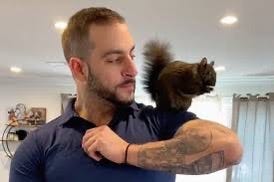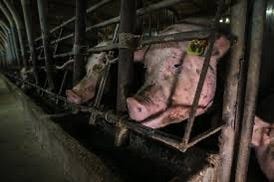The Heartbreak of Peanut Only Goes So Far.
Our treatment of animals allows and even ushers in the worst of our nature


For a few days now, the saga of Peanut the squirrel and Fred raccoon have been tugging at my heartstrings. Any pet owner will put themselves in the position of their owners - and the violation seems so shocking and tragic! That’s the power of this story…there is something about it that puts you in the place of their owners in a way that other news stories, even sometimes those of needless deaths of our fellow-man, that do not.
I contend that there is something about our stewardship of animals that says something profound about our essential values. And I know that might sound self evident, Through this story, a part of us that is moral was triggered. The unfairness and brutality of the whole situation in almost impossible to reconcile.
While my complaint is explicitly aimed at the injustice of cruelty, what I am really trying to say is the things we do to animals are simultaneously an expression of and an effect upon the soul of Man. In obvious, easy to process, non-complex situations, our morality is expressed superficially at the outrage over Peanut. But running more deeply is this largely unconscious participation in something truly evil.
Every day, we allow and even participate in the most egregious injustice to living creatures for our food. In the factory farms, tiny innocent piglets and chicks are raised in a matrix-like Hades for the sake of cheap, convenient meat - to which we are now dependent and addicted.
While we are the sorts of good people who can feel deeply the suffering of these aggrieved pet owners, and we can express the anger and outrage toward the callousness of the government agency who perpetuated this, we are numb and cut off from a daily practice worse in every way to this injustice and horror, in the sense that unlike Peanut and Fred, these animals live in torturous circumstances from the day of their birth to deaths which occur, thankfully in most cases, a few months later. (Leaving aside of course the breeding animals who are kept captive and effectively immobile in cages for years)
I think if you put this in terms of our civilization being built on slavery, you might understand a little more of what I’m trying to say about this dark mark. But 150 years ago we finally woke up and abandoned that practice. We knew this was a taint on our soul and our humanity. And we could not, with that awakening, tolerate this heinous practice any longer. In contrast, the practice of factory farming just seems to be increasing as huge corporations strong-arm small farmers out of existence, or pressure them with financial ruin if they don’t get on the bandwagon.
That is not to say that we are personally bad people because we eat meat from the grocery store. But it does say that a civilization, of which we are part in which this practice is our sustenance, has the mark of something as black and sinister as can be. Again, is it a product of doing what is “reasonable but not good”; our trajectory for some time now…or is that dark mark from participating? I propose it’s the former, which is another reason that if we are to be closer to the Godhead of Quality, we must take this problem much more seriously - lest it’s darkness branch out to further evils of which we remain unconscious until it’s too late?
In short, is our treatment of animals a sub-optimal but necessarily convenient aspect of modern life, or is it a by-product/cause of a darkness that is pushing us toward some of the self-righteous horrific behaviors we are displaying towards each other, and in our justification to the large-scale human suffering going on at this very moment in Gaza, Ukraine and elsewhere.
If at the basis of our sustenance is based on this evil, then our morality is on a very shaky foundation. So let’s take the better part of our nature, the outrage and sadness over the fates of poor little Peanut and Fred and carry that down a few notches. It’s time to give up these products, however cheap and make our outrage heard with the same volume. It’s time we understood how we can never be what our spontaneous sense of morality strives for if we continue to push aside, explain away, or worse ignore this dark mark on our humanity.
